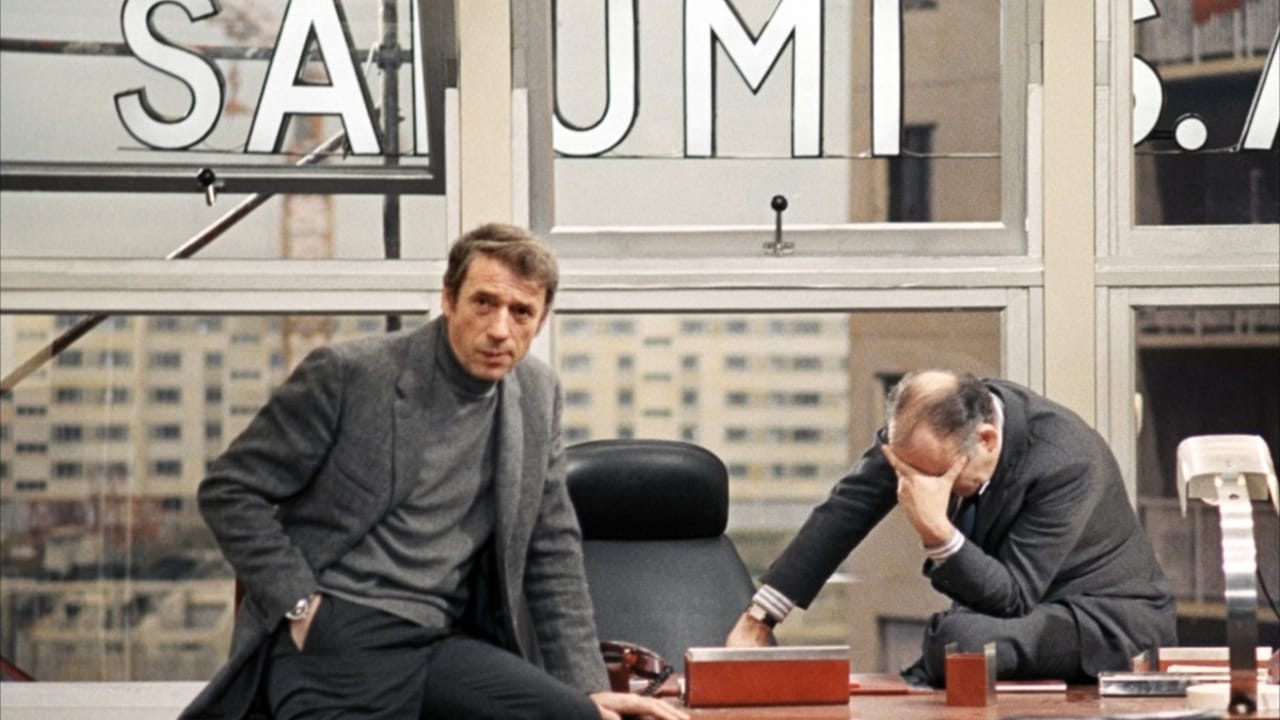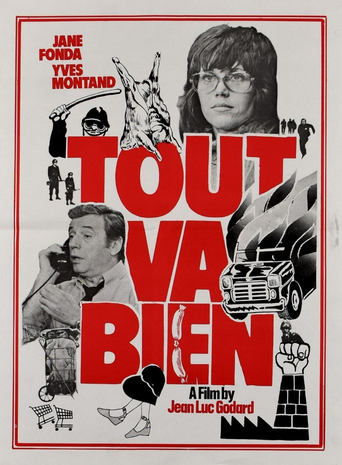

What a waste of my time!!!
... View MoreIt's fun, it's light, [but] it has a hard time when its tries to get heavy.
... View Morea film so unique, intoxicating and bizarre that it not only demands another viewing, but is also forgivable as a satirical comedy where the jokes eventually take the back seat.
... View MoreIt's funny, it's tense, it features two great performances from two actors and the director expertly creates a web of odd tension where you actually don't know what is happening for the majority of the run time.
... View MoreIn 1967 the French director Jean-Luc Godard, whose recent films had been increasingly imbued with political concerns and an infatuation with Mao, stepped away entirely from conventional filmmaking (even in its zany French New Wave form). Joining with his fellow French Maoist Jean-Pierre Gorin, he shot a series of self-funded political tracts that remain little-known today except to extreme Godard completists. But in 1972, after these years in the comparative wilderness, Godard and Gorin got funding to make a bigger-budget picture, with established stars Jane Fonda and Yves Montand. As they planned, the film would initially go through the motions of being a commercial-entertainment picture, but then move into overtly ideological territory. The result was TOUT VA BIEN ("Everything's Fine").Fonda plays an American news correspondent in Paris. Montand is her husband, a former film director who sold out to shoot television commercials for consumer products. As the film opens the reporter, with her husband tagging along, arrives at a meat-processing plant where she had an appointment to interview the director (played by Italo-French comedic actor Vittorio Caprioli). This turns out to be the same day when the plant workers strike and barricade the manager in his office -- and Fonda and Montand end up being stuck in his office with him. The first half of the film consists of the workers stridently clashing with the manager, as well as their union representative who they feel is compromising too much with management. In the second part of the film, Fonda and Montand's experience in the factory, revealing their own guilt and dissatisfaction, opens a rift in their relationship.There is a lot of farce in the first half of the film, and a darkly humorous misanthropy. Godard may have been intrigued by the romance of revolutionary politics, but he depicts the workers as venial, squabbling people that are nearly as awful as the exploitative management. Godard and Gorin make heavy use of Brechtian alienation techniques here, where the audience is continually reminded that they are watching a staged drama, not real life. Thus the factory director reads his lines in a hyperbolic comedic fashion, while other performers seem to be reading their lines in improvised fashion off a sheet of paper offscreen. Fonda and Montand are not directed to act much at all, rather they mainly stand on screen as token "movie stars" and only observe the workers' action. Naturally, French Maoism has not aged well as a political ideology, and people today will see this as a time capsule of a past age in politics than a powerful for the present. Still, Godard and Gorin do capture some timeless truths about how hard it is for the working class to put its frustrations into words.In spite of being shot years into Godard's middle, "Maoist" period when he had supposedly left the New Wave behind entirely, from the very first frame one is likely to find this readily a continuation of his mid-1960s work. The visual aesthetic, i.e. the bright colours -- usually those of the French flag -- the way his actors are instructed to stand, and the general mise-en-scene are the same as his work from PIERROT LE FOU to WEEKEND. There is a reason for that: Godard had a serious motorcycle accident during the initial stages of the film, and while he was recuperating, Gorin had to do most of the directing. Gorin intentionally chose to emulate various bits of Godard's earlier films. This is important to note, because the 1970s would be a decade when Godard's visual style and editing would change dramatically, but due to Gorin's role this film looks backwards to early Godard instead of forward to late Godard. But even if it is a deliberate retread of earlier Godard, it is still visually gorgeous, and the elaborate shot in a hypermarket towards the end (by which Gorin imitated the car crash scene in WEEKEND) deserves to be acclaimed as one of cinema's great long takes.Another effect of Gorin's look to the past is that, if it weren't for shots of France outside the film's set, where we can see that the new fashions and music of the Seventies have come, a viewer might think this was a Sixties film. Nonetheless, there are some fresh things here, namely the appearance of feminist concerns (something generally missing from Sixties radicalism). With its repeated mentions of May 1968, TOUT VA BIEN also captures a very interesting moment in time, when May '68 was close enough to be relatively fresh, but far enough in the past that people could understand what a failure it had proved and wax nostalgically about it.TOUT VA BIEN has never been among Godard's most acclaimed films, and as I said, visually it is a sort of retread. Yet, I greatly enjoyed this film. For me, the mid-late 1960s and early 1970s were a very special time in French history (and in Western history more generally), and watching TOUT VA BIEN really does take one back to that era. I wouldn't recommend this to someone totally unfamiliar with Godard, but if you have seen all his New Wave work, then continue on to this.
... View MoreI've read commentaries of it being a lesser or unaccessible Godard, but for me it was just astonishing; seriously this film is brilliant on so many levels. Sure is kind of in your face consumerism and capitalism critic, but it has beautiful imagery with interesting symbolism, narratively speaking the way the story is presented with it's long lateral takes (the supermarket tracking shot is awesome)and also the film within a film concept in a very unorthodox way (the way he reminds us it's all a film by showing us the that the factory is a set for example)was fascinating, Godard being represented (mocking himself?) by Montad in that scene where he's interviewed(the part in which Montad speaks about the nouvelle vague) and the beautiful use of color made for a haunting experience for me.
... View MorePerhaps I'm insufficiently attuned to the works of Jean-Luc Godard--though I'm a huge fan of Breathless and Weekend--but Tout va bien plays like a comedy to me. The film satirizes multiple targets: the conventions of film-making, the pompous self importance of the bourgeoisie, the underdeveloped logic of the lumpen proletariat, and so much more, including Godard himself. Did you enjoy the legendary tracking shot in Weekend? Well, you'll love the multiple tracking shots in Tout va bien, which take place in the offices of a sausage factory (what could be more emblematic of commercial film-making?) and in a supermarket where riot police are doing battle with shoppers. Yes, there's plenty of political content for those so inclined, but for me, this film is akin to Lindsay Anderson's acerbic Britannia Hospital: nothing is sacred. Highly recommended, and I'd have given it a '10' if not for the presence of the eternally irksome Jane Fonda and her horrible '70s shag hair-do.
... View MoreI really don't like Godard. He's getting on my nerves more than the usual filmmaker I don't like, because you can't let him aside. He did some very important stuff in cinema history, but I can't bear to watch his movie without swearing my head off.Tout va bien is interesting, don't get me wrong, but as usual in Godard movies, he takes over his own movie, he takes over his characters he makes them meaningless and only a visual example of a huge left wing message he's trying to fit in. Guess what Jean-Luc? I'm no left winger. To stay polite, watching this movie I felt like a foreign object entering into one of my body's orifices. Interesting situations, interesting filming, interesting experiments...but his political convictions are taking over the movie waaaaaaaay too much.I feel great that I watched this movie though. It has it's place in cinema history...and thank god, I don't have to watch it again. Godard is a necessary pain for everybody who wants to explore everything cinema has to offer.
... View More